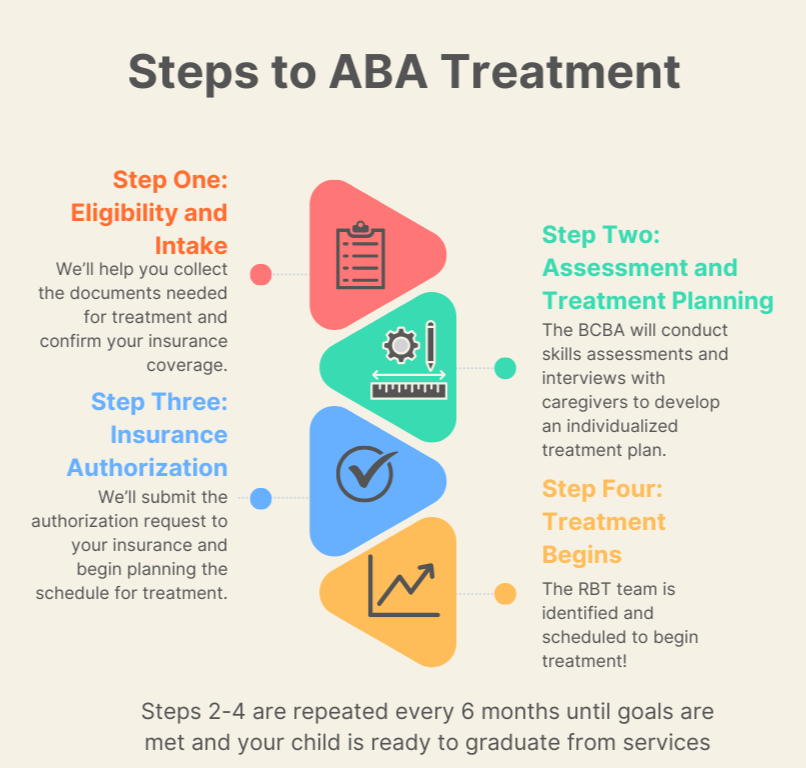ABA Treatment:
Evidence-Based Therapy for Autism Spectrum Disorder
The foundation of autism care is Applied Behavior Analysis (ABA) services. Backed by decades of research showing its effectiveness in improving the lives of individuals with autism, high quality ABA services are considered the "best-practice” intervention by the Council of Autism Service Providers.
How does ABA work?
ABA, or Applied Behavior Analysis, works by strategically making changes to the learner’s environment so they can practice and develop new, developmentally-appropriate skillsets that help them be more independent, safer, and better equipped to navigate the world. By altering the flows of information and reinforcement available in the environment, practicing new skills becomes more motivating, allowing for meaningful skill development to occur.
What kinds of skills can ABA help with?
ABA targets foundational skills essential for independent, joyful living, including:
Communication (Expressing thoughts and feelings and needs, listening to and understanding instructions)
Social skills (Interacting with others, relationships, conversational skills)
Safety (community navigation, internet usage, household safety)
Daily Living Routines (hygiene, taking care of home/self)
School Readiness (following instructions, asking for help, attending to group instruction)
Adult Transitions (job readiness, higher education preparation, relationship and dating)
ABA also can teach replacement skills to many challenging behaviors that impede learning, including tantrumming, aggression, self-injurious behaviors, and elopement.
Who provides ABA therapy?
ABA treatment is delivered under the direction of a Board Certified Behavior Analyst (BCBA), a master’s degree-level clinician who has received specialized training in using behavioral principles to improve a client’s quality of life. Your BCBA will be your go-to contact regarding your child’s treatment. They perform the assessment, develop the treatment plan, and conduct training sessions with you to maximize the impact of services.
Day-to-day sessions are administered by a Registered Behavior Technician (RBT), an entry-level clinician who has been certified to provide direct ABA services. The RBTs that work with your client are trained to deliver engaging, fun, and meaningful interventions individualized to your child’s goals. The BCBA will supervise the RBTs regularly and provide them coaching to ensure the treatment plan is effectively implemented.
What does ABA look like in practice?
That’s hard to say! Quality ABA is highly individualized to the unique needs, preferences, and goals of the learner and delivered in the way that is the most engaging to them individually. For younger children, ABA sessions will look like structured play to embed learning opportunities naturally in their day. For older clients, sessions may look more like tutoring or coaching, appropriate to the goals being worked on. The RBT conducting the session is side-by-side to take advantage of each opportunity to practice the goals and skills identified in the treatment plan.
In all cases, your RBTs will be collecting information (i.e., data) on how your child responds to session so progress can be regularly tracked towards your child’s goals using a HIPAA-compliant web app on a company-provided tablet.
How much ABA therapy does my child need?
ABA is an intensive therapy service and a commitment to your child’s future. Research shows that for best results, treatment dosages should be individualized to your child’s unique needs and goals. This most often ranges from 10-30+ weekly hours of treatment, often lasting for 6-18 months.
Many ABA providers require full-time commitments to care (e.g., 30-40 weekly hours) to be admitted to their program. Great Day ABA is committed to the sustainability of treatment and providing only medically necessary levels of care to our clients. Your BCBA will work with you to identify the best dosage of ABA treatment to achieve your child’s goals as effectively as possible.

